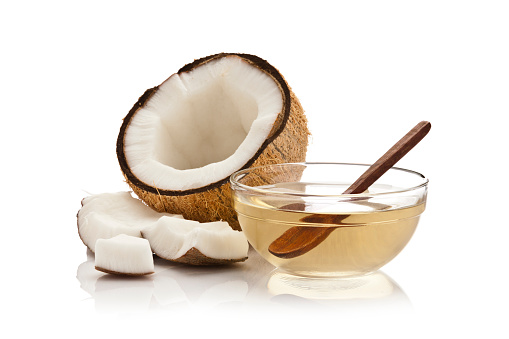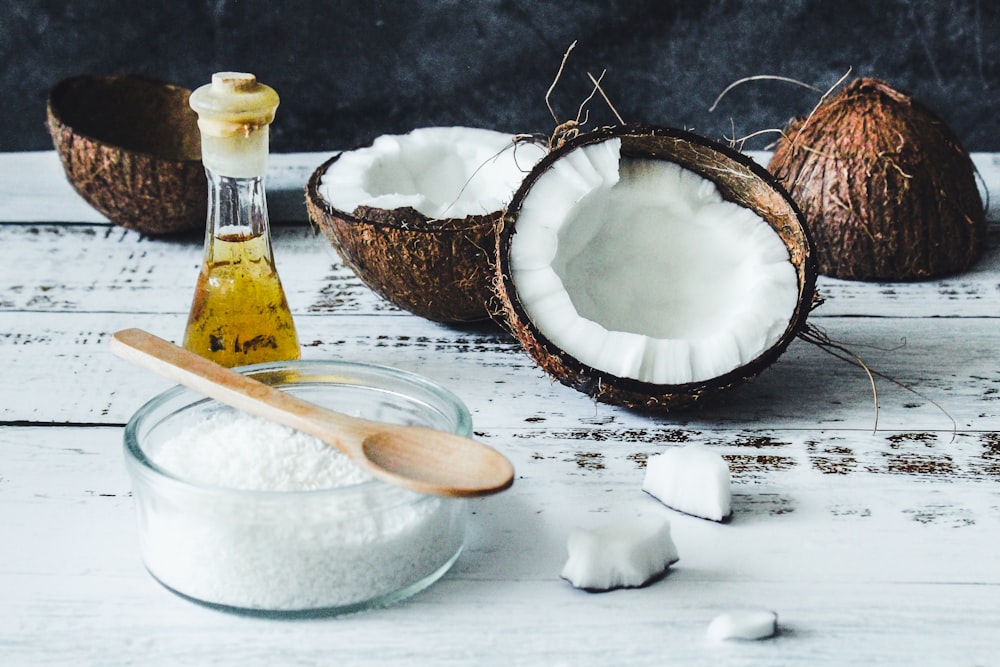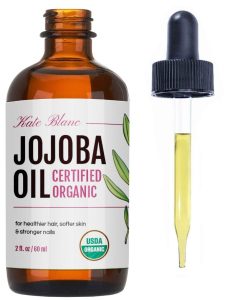There are many varied opinions on Jojoba Oil Vs Coconut Oil. Some claim coconut oil is better while others think jojoba is better for skin and hair, since it closely mimics natural sebum.
However, there can never be an absolute answer to which of these is a winner over the other since both of these have different benefits and uses. Below, we will be going over the facts and the benefits of each, so you can decide for yourself which one is better.
Contents
- 1 Jojoba Oil Vs Coconut Oil: Overall Difference
- 2 Jojoba Oil Vs Coconut Oil Benefits
- 3 Which Is Better Jojoba Oil Or Coconut Oil?
- 4 Can Jojoba Oil Replace Coconut Oil?
- 5 Can You Mix Coconut Oil With Jojoba Oil?
- 6 Why Mixing Jojoba Oil And Coconut Oil Is A Good Idea?
- 7 Jojoba Oil Vs Coconut Oil For Hair
- 8 Jojoba Oil Vs Coconut Oil For Skin
- 9 Jojoba Oil Vs Coconut Oil For Eczema
- 10 Jojoba Oil Vs Coconut Oil For Face
- 11 Jojoba Oil Vs Coconut Oil For Hair Loss
- 12 Jojoba Oil Vs Coconut Oil For Dandruff
- 13 Jojoba Oil Vs Coconut Oil Ratio For Hair And Skin
- 14 Jojoba Oil Vs Coconut Oil: Side Effects
- 15 Jojoba Oil Vs Coconut Oil: Summary
Jojoba Oil Vs Coconut Oil: Overall Difference
Jojoba oil is the liquid wax ester that comes from the seeds of Simmondsia chinensis, or jojoba plant. It has been used as a traditional medicine by the native people of North America for hundreds of years, and is now commonly found in shampoos, conditioners and lotions due to its moisturizing properties.
Coconut oil on the other hand, is often referred to as “nature’s most effective moisturizer” and has been used for ages. It is the oil expressed from the dried fruit of coconuts and contains lauric acid, a compound found in mother’s milk that strengthens immunity.
Jojoba oil closely mimics human sebum (oil) and does not clog pores like other oils such as coconut or olive oil. It has a long shelf life and does not require refrigeration, but it is expensive. Coconut oil on the other hand, is a cheaper alternative to jojoba oil and has a shorter shelf-life.
Although it goes rancid quickly, the acidity makes it unsuitable for bacteria growth while stored in moderate temperatures, meaning there’s no need for refrigerator storage. In addition to its moisturizing properties, coconut oil can also be used as an antibacterial agent and effective in removing stubborn makeup.
Below, we are summarizing the differences between these oils from various important aspects:
1. Smell
Coconut oil has an earthy smell while jojoba oil has a nutty smell.
Related Video –
2. Absorption rate
Jojoba oil absorbs into skin very easily and does not leave the oily feeling that other oils such as coconut or olive oil do, but it is expensive. On the other hand, coconut oil takes longer to absorb than jojoba oil but leaves no oily residue behind.
3. Effectiveness For Different Uses
Both of these oils can be used on hair and skin in various ways, but they are both most effective when used together with other ingredients (for example aloe vera gel). Jojoba is suitable for all skin types while coconut is best suited for dry skin since it locks moisture in.
4. Shelf-life
Jojoba oil has a longer shelf life due to its thick consistency while coconut oil goes rancid fast, requiring it to be kept in cool storage or refrigeration.
5. Price
Coconut oil is cheaper than jojoba oil, but both are more expensive than most other oils on the market.
Related Video – Coconut Vs Jojoba Oil
Jojoba Oil Vs Coconut Oil Benefits
Below, we are summing up the benefits of both these oils, making it easier for you to pick your favorite among the two:
Jojoba Oil Benefits
Jojoba oil is full of vitamins and minerals, meaning it is good for the skin and hair. It moisturizes the skin without leaving a greasy residue. It absorbs easily into the skin and has been said to increase collagen production (which reduces wrinkles). It mimics sebum which makes it suitable for all skin types including oily skin.
Coconut Oil Benefits
Coconut oil contains lauric acid which strengthens immunity in addition to its moisturizing properties. It can also be used as an effective antibacterial agent that’s gentle enough for babies and children.

Its cleansing abilities make it suitable for removing stubborn makeup such as long-lasting lipsticks and mascaras without causing eye irritation like other makeup removers do. In addition, coconut oil has been said to slow down aging and even fade dark spots.
In Conclusion: Jojoba oil is expensive but full of vitamins and minerals, making it good for the skin and hair. Coconut oil on the other hand, is a cheaper alternative to jojoba oil with a shorter shelf-life that requires storage in cool areas or refrigeration.
Both oils can be used on the skin and hair in various ways, but they are most effective when used together with other ingredients such as aloe vera gel.
Which Is Better Jojoba Oil Or Coconut Oil?
Nature’s most effective moisturizer is jojoba oil that closely mimics human sebum and cannot be easily clogged by pores. Coconut oil, on the other hand, is more affordable than jojoba oil but has a shorter shelf-life due to quick absorbing properties.
Nevertheless, both can be used for various purposes including makeup removal or hair moisturizing. The answer as to which one of these is better entirely depends on your preference and budget. But in general, jojoba oil is more expensive but it’s also known to be better for skin care than coconut oil.
Coconut oil can be used on its own or even with other ingredients like aloe vera gel while jojoba oil should always blended with other substances due to its thick consistency that cannot be absorbed into the skin without added help.

Therefore, you may think of it this way: if you’re looking for a product to use regularly along with your daily makeup routine, choose jojoba oil since it is good for all types of skin and hair and can easily blend into your foundation.
On the other hand, if you want a cheaper alternative that offers similar in addition to being gentle enough to use with babies and children, go for coconut oil. After all, it is full of essential nutrients and may even help in slowing down aging and fading away dark spots.
Can Jojoba Oil Replace Coconut Oil?
Coconut oil is widely used for both cooking and body care products. It can be used as a substitute to butter in baking, added into smoothies or oatmeal, or even consumed directly for its numerous health benefits (it aids in weight loss, boosts immunity, improves digestion etc.).
With so many uses, it’s no wonder people are wondering whether coconut oil can be replaced by jojoba oil. The answer is No. Coconut oil cannot replace jojoba oil since they have different properties. Here are some of the reasons why:
Reason 1: Their Consistency Differs Greatly
Jojoba is thick while coconut oil is thin that requires storage in cool areas or refrigeration to prevent it going rancid fast. The shelf life of jojoba oil is about 2 to 3 years while coconut oil only lasts for about one year.
Reason 2: They’re Not Easily Absorbed Into The Skin
Coconut oil can be readily absorbed by the skin and hair since it’s thin and full of medium-chain fatty acids (MCFA). On the other hand, jojoba oil requires added help such as mixing with aloe vera gel or olive oil before it can be fully absorbed into the skin.
Reason 3: Their Benefits Vary Greatly
The benefits of each vary greatly; coconut oil contains lauric acid which strengthens immunity whereas jojoba has anti-inflammatory properties that soothe irritated skin including eczema, psoriasis, etc.
Meanwhile, jojoba contains Vitamin E which aids in regenerating skin cells and prevents signs of aging.
Can You Mix Coconut Oil With Jojoba Oil?
Mixing jojoba oil with coconut oil does not affect the properties of each. Coconut oil will not be absorbed into the skin as easily but it also has the added effect of keeping jojoba stable for a longer period which is why it’s commonly used in lip balms or sunscreens that require ingredients to remain fresh for an extended duration.
On the other hand, mixing jojoba with coconut will allow them to blend better without compromising their properties. The best way to mix these two oils is by adding one part coconut and 2 parts jojoba before applying on scalp hair or skin.
Why Mixing Jojoba Oil And Coconut Oil Is A Good Idea?
When mixed together, both oils are able to do more than they can on their own. Here are some of the reasons why:
- Both oils contain anti-fungal and antibacterial properties that work together to improve skin problems such as acne, eczema, psoriasis etc.
- They help in improving blood circulation which helps in faster healing of wounds or other injuries.
- They moisturize hair and prolong its shine and softness.
- The combination helps nourish dry scalp, flaky dandruff, split ends and hair loss if used regularly.
Jojoba Oil Vs Coconut Oil For Hair
As mentioned, both oils are good nourishers and moisturizers for scalp and hair. However, jojoba oil is more preferred because of these reasons:
It is not as heavy as coconut; hence it won’t weigh down the roots or leave a greasy feel on your scalp. Jojoba sinks deep into the skin to improve its condition from within. Coconut oil has a tendency to sit on top of the skin which means you’ll need to wash your hair often (or pair it with baking soda as shampoo) to prevent residues from sticking on your scalp.
It can be used by those who have sensitive skin since it’s hypoallergenic and mild even when applied directly on the scalp.
Jojoba Oil Vs Coconut Oil For Skin
Both oils are absorbed easily into the skin to provide moisture without leaving a greasy feel. Jojoba oil has more benefits because of its rich Vitamin E content that aids in the regeneration of new skin cells, prevents signs of aging and helps heal scars quickly. Meanwhile, coconut oil is used only as a moisturizer since it doesn’t have any regenerative properties.
Jojoba Oil Vs Coconut Oil For Eczema
Both oils have anti-inflammatory properties that help soothe irritated skin as well as antibacterial properties to fight infection. The only difference is with the way it’s absorbed by your skin – coconut oil takes longer since it has to go through several layers of epidermis.
Jojoba oil penetrates deep into the skin to increase blood circulation for faster healing, which is perfect for irritated or inflamed skin especially eczema and psoriasis.
Jojoba Oil Vs Coconut Oil For Face
Pure coconut oil is not safe for your face and can clog pores even if it’s 100% pure. It should only be used as a moisturizer since it doesn’t have other properties such as antibacterial for acne treatment.
Jojoba oil, on the other hand, penetrates deeper into the skin which makes it effective in treating acne-prone skin without causing breakouts or irritation. Of course, you can use both oils at once by mixing one part jojoba to three parts coconut oil then apply onto the affected area using cotton buds or ball tip applicators.
This provides fast relief from eczema flareups especially when rubbed directly to the inflamed areas of the skin. The mixture also soothes irritated patches caused by psoriasis.
Jojoba Oil Vs Coconut Oil For Hair Loss
Coconut oil is known to help stimulate hair growth by improving blood circulation at the roots while jojoba can nourish and moisturize strands for improved shine, volume and overall texture. Both oils are effective in preventing dandruff (coconut oil more so since it’s antibacterial) and split ends which lead to loss of hair.
How To Apply:
Mix coconut or jojoba oil with other essential oils such as lavender or rosemary then massage onto the scalp before going to bed; this helps reduce itching and inflammation caused by psoriasis or eczema when you wake up in the morning.
You can also add a few drops of essential oil such as lavender to your regular shampoo and conditioner to provide a double dose of moisturizing.
Mix coconut or jojoba oil with one cup hot water then apply onto the scalp; leave for five minutes before rinsing off for faster relief from dry, itchy and flaky scalp caused by dandruff.
Jojoba Oil Vs Coconut Oil For Dandruff
Both oils are effective in treating dandruff but coconut oil penetrates faster since it’s derived from fats – this makes it more useful when you need fast relief. It also treats other scalp problems such as psoriasis and eczema.
However, using pure coconut oil for your hair isn’t safe; hence make sure to dilute it with at least one part jojoba before massaging onto the scalp or applying onto your hair.
Jojoba Oil Vs Coconut Oil Ratio For Hair And Skin
The ratio depends on your condition; whether you have dry scalp/hair, dandruff or frequent split-ends. The following ratios show how much jojoba or coconut should be mixed with water for effective treatment:
For Dry Hair Or Dandruff
Mix one cup jojoba oil with one cup coconut oil and add four cups of water. Use as a shampoo after every other day (ideally, this should be used daily since it’s diluted).
For Dry Scalp Or Flaky Dandruff
Mix two tablespoons jojoba with two tablespoons coconut then add enough water to create a paste. Apply on the roots and leave for 20 minutes before washing off.
As A Moisturizer
Mix equal parts jojoba and coconut oils then apply directly onto the skin, paying special attention to your heels, elbows, knees etc which naturally lose moisture too quickly. Mixing With Other Oils In all cases where you’re mixing jojoba or coconut oil with another moisturizing or nourishing such as shea or cocoa butter, you’ll need to use the same amount of each oil.
So, if you want 1/4 cup coconut oil for your skin after a bath, make sure it’s complemented by 1/2 cup jojoba and 1/4 cup cocoa butter. This is because fats such as shea and cocoa butter tend to be heavier than oils; hence they can weigh down your hair if used alone.
Jojoba Oil Vs Coconut Oil: Side Effects
Coconut oil is very effective in the treatment of dry scalp but it also has its own side effects such as hair breakage, hair fall and hair discoloration. It’s very greasy so you have to shampoo twice or thrice before using regular conditioner – this could cause more damage especially if your hair is already weak or damaged.
Coconut oil has to be eliminated from your hair completely before styling otherwise it just won’t work.
Jojoba oil, on the other hand, is very light so you can use it as leave-in conditioner without having to shampoo again; but if you prefer washing your hair first, do so with mild shampoo and warm water.
You should only use jojoba oil on your face since it can irritate sensitive skin if used too often without proper dilution. It’s also a bit greasy which clogs pores when applied directly on your face; hence you need to mix it with other essential oils before applying onto affected areas.
Jojoba Oil Vs Coconut Oil: Summary
Coconut oil moisturizes skin, improves its texture and evens out skin tone better than jojoba oil which can get very greasy once applied directly on the skin without mixing with other essential oils first. Jojoba is a little bit expensive than coconut oil but it penetrates deeper which makes it useful for acne-prone skin.
Both oils are effective in treating dry scalp; coconut oil treats dandruff more quickly since it’s antibacterial while jojoba can hydrate strands without causing hair fall or breakage. Jojoba is safe to use on your face (when mixed with other essential oils) whereas pure coconut oil should never be applied directly on the skin since it clogs pores and causes irritation.

![30 Best Jojoba Oil Shampoo [Reviewed] 30 Best Jojoba Oil Shampoo [Reviewed]](https://theoilvirtue.com/wp-content/uploads/2022/02/J·R·LIGGETTS-All-Natural-Shampoo-Bar-Jojoba-And-Peppermint-300x300.jpg)
![15 Best Jojoba Oil Body Oil [Reviewed] 15 Best Jojoba Oil Body Oil [Reviewed]](https://theoilvirtue.com/wp-content/uploads/2022/02/Jojoba-Oil-By-Leven-Rose-Pure-Cold-Pressed-Organic-Unrefined-Moisturizer-For-Skin-Hair-Body-Nails-And-Cuticles-300x300.jpg)
![20 Best Jojoba Oil Shave Oil [Reviewed] 20 Best Jojoba Oil Shave Oil [Reviewed]](https://theoilvirtue.com/wp-content/uploads/2022/02/The-Man-Company-100-Natural-Beard-Oil-For-Men-With-Almond-Oil-Thyme-Argan-And-Jojoba-Oil-300x300.jpg)

![15 Best Jojoba Oil Hair Oil [REVIEWED] 15 Best Jojoba Oil Hair Oil [REVIEWED]](https://theoilvirtue.com/wp-content/uploads/2022/02/Cliganic-USDA-Organic-Jojoba-Oil-100-Pure-Natural-Cold-Pressed-Unrefined-Hexane-Free-Oil-For-Hair-Face-243x300.jpg)
![12 Best Jojoba Carrier Oils [REVIEWED] 12 Best Jojoba Carrier Oils [REVIEWED]](https://theoilvirtue.com/wp-content/uploads/2022/02/Cliganic-USDA-Organic-Jojoba-Oil-100-Pure-Natural-Cold-Pressed-Unrefined-Hexane-Free-Oil-For-Hair-Face-Base-Carrier-Oil-244x300.jpg)


![10 Best Jojoba Oil Gallon [Reviewed] 10 Best Jojoba Oil Gallon [Reviewed]](https://theoilvirtue.com/wp-content/uploads/2022/02/Cliganic-Jojoba-Oil-Non-GMO-Bulk-Gallon-128oz-100-Pure-Natural-Cold-Pressed-Unrefined-Hexane-Free-Oil-For-Hair-Face-167x300.jpg)




![18 Best Jojoba Oil Soap [Reviewed] 18 Best Jojoba Oil Soap [Reviewed]](https://theoilvirtue.com/wp-content/uploads/2022/02/Cove-Castile-Soap-Unscented-Organic-Argan-Jojoba-And-Hemp-Oils-228x300.jpg)

